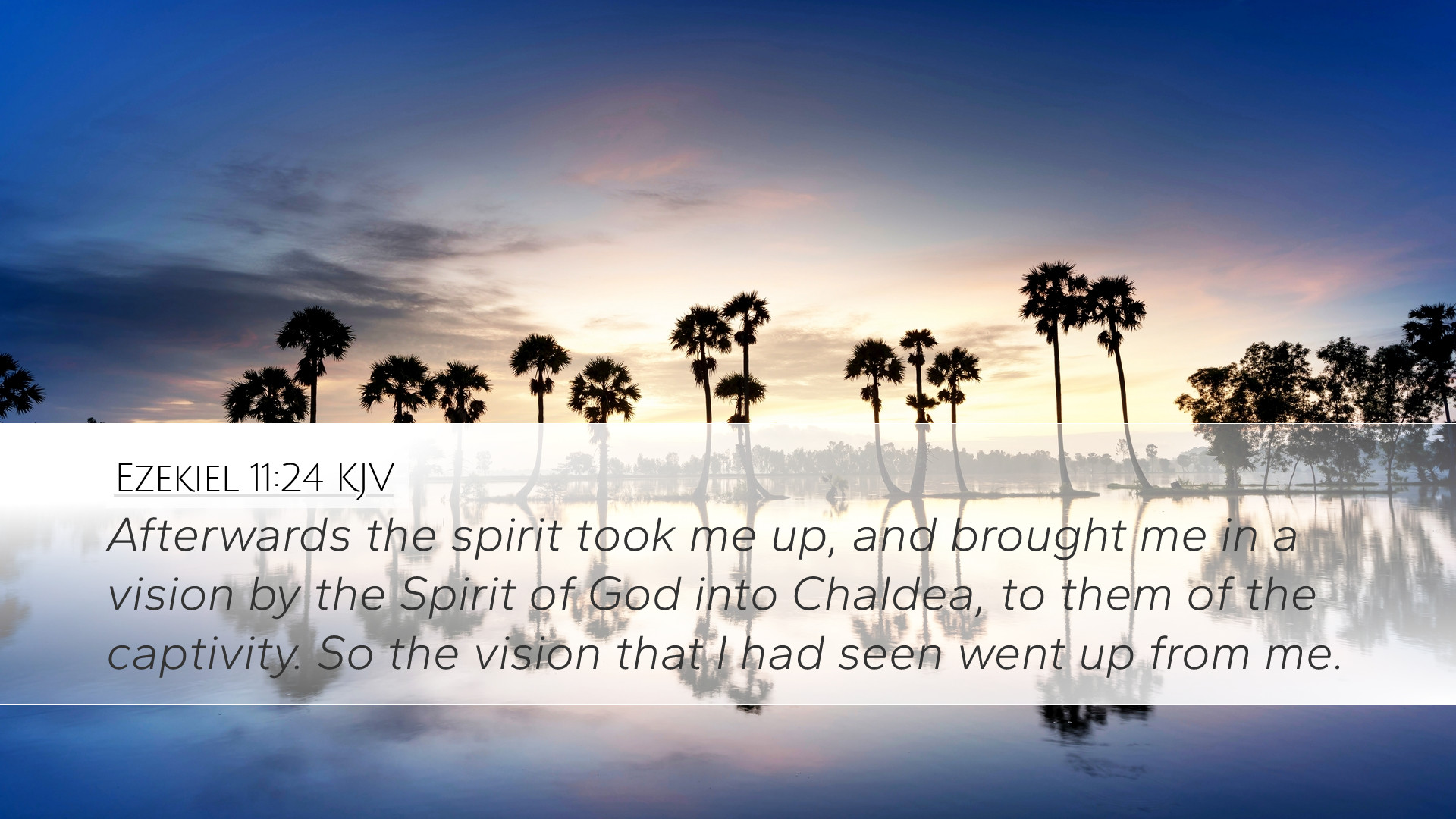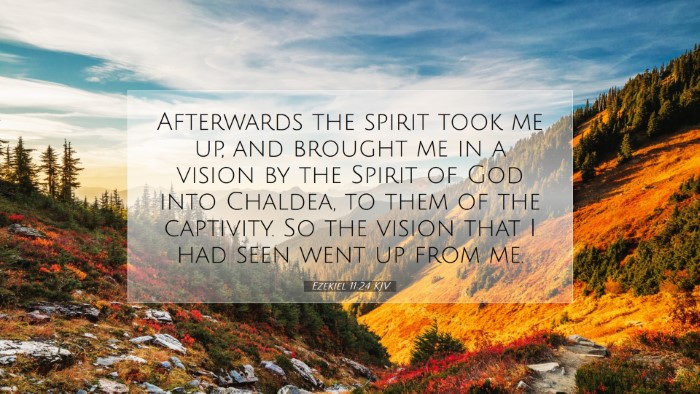Ezekiel 11:24 Commentary
Verse: "And the spirit took me up, and brought me in a vision by the Spirit of God into Chaldea, to them of the captivity. So the vision that I had seen went up from me."
Introduction
The book of Ezekiel is replete with visions and prophetic insights that challenge both the heart and mind. Ezekiel 11:24 serves as a pivotal moment in this prophetic narrative, where the prophet is led by the Spirit into a deeper understanding of God's plan for Israel during their captivity. This commentary will synthesize insights from noted public domain sources, providing a rich exploration of this verse.
Contextual Background
Ezekiel's prophetic ministry occurred during the Babylonian exile, a time of deep despair and confusion for the Jewish people. Understanding the context of Ezekiel’s audience—those who were forcibly removed from their homeland—enriches our interpretation of the text. The chapter opens with a discourse on the judgment that was to come upon Jerusalem, juxtaposed with the promise of future restoration.
The Role of the Spirit
According to Matthew Henry, the role of the Spirit in this verse signifies divine guidance and empowerment. Ezekiel is not merely a passive observer, but an active participant in a celestial orchestration that aims to reveal God's purposes. The phrase "the spirit took me up" underscores the necessity of divine intervention in understanding and responding to God's revelations.
Adam Clarke further expounds on this notion, asserting that the Spirit's transportation of Ezekiel signifies both a literal and metaphorical transition from despair to hope. The Spirit functions as a mediator, transporting the prophet to the land of the captives to offer them messages of comfort and assurance. This highlights the omnipresence of God's concern beyond geographical constraints.
Vision and Its Significance
The vision Ezekiel experiences is crucial. As Albert Barnes notes, visions were a primary means through which God communicated His will to the prophets. The essence of this particular vision is not merely about observing the exiled community, but about infusing them with a sense of divine purpose amid their suffering.
This vision represents God’s undeniable presence within the valley of dry bones—an illustration of the people’s spiritual state and the provision of hope. Ezekiel's visitation to Chaldea shows that God's mercy extends even to those in exile, reminding them that their identity is not lost despite their external circumstances.
Returning to the Captives
The latter part of the verse indicates that the vision "went up from me," suggesting a transitory experience that is both temporary and transformative. Matthew Henry implies that the departure of the vision signifies the completion of the message God had for Ezekiel to convey. This cyclical nature of prophetic revelation and its eventual transmission is vital for understanding the movement of God's Spirit among His people.
Theological Implications
From a theological perspective, this verse teaches about the sovereignty of God in the lives of His people, especially during apparent desolation. Adam Clarke emphasizes that the Spirit guides not merely for personal revelation but for collective awakening. This speaks to the communal aspect of faith; even in isolation, there is a divine purpose that encompasses the lives of God's faithful.
Applications for Modern Believers
There are profound applications from Ezekiel 11:24 for contemporary believers. In times of uncertainty and distress, one can find comfort in the truth that God’s Spirit is active among those who feel lost or imprisoned by their circumstances. Here are some practical reflections:
- Awareness of God's Presence: Just as Ezekiel was taken up by the Spirit, believers today must remain cognizant of God's active involvement in their lives.
- Restoration is Possible: The narrative champions the belief that God can restore brokenness, even amidst dire situations like exile or despair.
- Community Focus: The emphasis on being brought to the captives highlights the importance of being genuinely involved in the lives of others, serving as vessels of hope.
- Prophetic Voice: Just as Ezekiel was called to speak God's truth to a captive audience, modern believers are called to articulate God’s promises in both word and action.
Conclusion
In summary, Ezekiel 11:24 serves as a profound reminder of God’s relentless pursuit of His people, extending His hand even in times of exile. The insights garnered from public domain commentaries illustrate the cohesive nature of prophetic literature and offer valuable lessons for individuals and communities alike. As we navigate through struggles, may we find assurance in the Spirit's guidance and remain committed to uncovering and communicating God's grand narrative of redemption.


